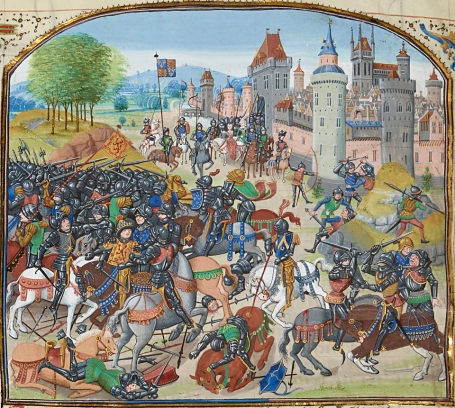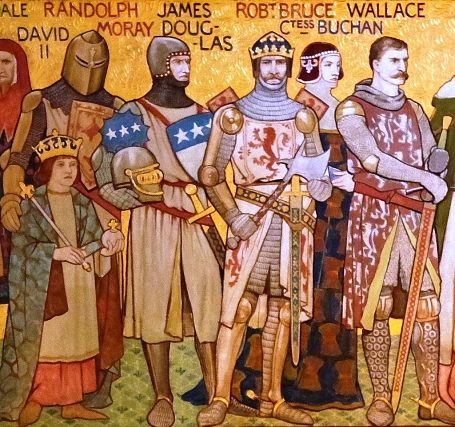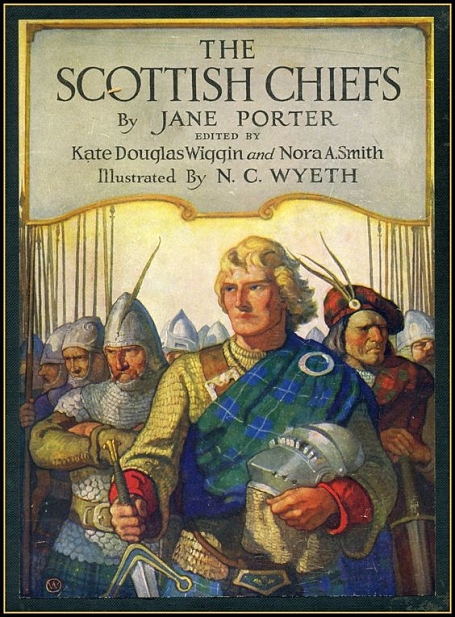The Life and Heroick Actions of the Renoun'd Sir William Wallace,
General and Governour of Scotland
by William Hamilton of Gilbertfield
Book VIII, Chapter IV (Continued)
The Siege of YORK
At his Command most busily they wrought,
Great store of Wood unto the Place they brought.
The Bulwark won, then closly at the last,
Unto the Barmkin, heaps of Timber cast.
The Bow-Men fiercely shot on ev'ry Side,
But South'ron worsted were for all their Pride.
Women and Children, on their Knees do fall,
And loud for Mercy, do on Wallace call.
So pitiful he was, tho' bold and stout,
He heard their Crys, and let them safely out.
Then Fire, and smoak, in fearfull Clouds arose,
And burning Flames, all round their Castle goes.
Barrels of Pitch, which stood long there before,
Went all in Flame, the Mischief was the more.
Both Man, and Beast, are are all burn'd up with Fire;
Thus Wallace Host have got their Hearts Desire.
Fechew himself, smother'd with Smoak, and Smell,
Lap from a Hight, and on the Barmkin fell.
With a good Sword, Wallace struck off his Head,
Five Hundred more were choak'd, and burned dead.
On the next Day, the Fire being spent,
Wallace's Men, unto the Castle went.
Struck down the Gate, and took what they could find,
Jewels, and Gold, great Riches to their Mind,
Spoiled the Place, and nothing else left there,
But Beasts, burnt Bodys, and great Buildings bare.
Then Wallace, to the Widow of Fechew
Said, "Promise here, as you'r a Woman true,
To turse your Husband's Head, to London Town,
And tell King Edward, if he do not soon
Give Battle, I do swear by all the Fates,
This Moneth once, to be at London Gates.
For if he keep not's faithful Word to me,
All the South-west of England I shall see.
To London Town then without more she went,
Where Edward lay, displeas'd and ill content.
His Nephew's Head did him with Anguish fill,
And more and more increas'd his Sorrows still.
With great unease upon his Feet he stood
Weeping and wailing for his tender Blood.
Then rose the Council, praying him to cease,
"We England lose, unless we purchase Peace."
Woodstock, for Peace was clear, then in the End,
The King consents and bids a Message send;
No Man the Message there would undertake,
Because the King so oft his Faith did break.
The Queen, when she saw all refuse the Thing,
Down on her Knees she fell before the King.
"Soveraign," she said, "if it your Pleasure be,
I pray, permit me Wallace once to see.
Perhaps he may do more for Woman fair,
Than for your Men that mind him still of War.
If with him I prevail not very soon,
I may return with little Damage done."
The Lords were glad the Queen was minded so,
And humbly beg'd the King to let her go.
To which the King, altho' much discontent,
And backward to it, did at last consent.
Some said the Queen did Wallace much admire,
Who daily so much Honour did acquire,
And in her Heart, by far did him prefer
To most of Men, for his brave Character.
And that she lov'd him; but till once they meet
I'll pass no Judgement, 'tween themselves Two be't:
Mean Time she's march'd, (to leave our Drolls and Jests,)
With Fifty Ladies and Seven ancient Priests.
Now Edward, for Fechew does sigh and mourn,
But unto Wallace, I must now return.
The worthy Scots, among the Suthron ride,
And great Destruction make, on ev'ry Side.
The Host was glad, and blest their happy Fate,
No Force there was that durst with them debate.
Riches, and Gold, they got their very fill,
And ev'ry Thing they pleas'd at their own Will.
South they are march'd, and to St. Albans gone,
In all that Country, Damage did they none.
The Prior sent them Vennison and Wine,
Refresh't the Host, and made them bravely Dine.
The Night appeared shortly in the Place,
Then pitch'd their Tents from thence a little Space.
Into a Valley, by a River fair,
Where Hart and Hynd on either Side repair,
Their Watches set, all in good Order keep,
To Supper went and in due Time did sleep.
The ballad, The Life and Heroick Actions of the Renoun'd Sir William Wallace, General and Governour of Scotland, by William Hamilton of Gilbertfield, 1722, is in the public domain.

The Kingdom of England and the Kingdom of Scotland fought dozens of battles with each other. They fought typically over land, particularly Berwick-Upon-Tweed, and the Anglo-Scottish border frequently changed as a result. Read more at Wikipedia.

The First War of Scottish Independence was the initial chapter of engagements in a series of warring periods between English and Scottish forces lasting from the invasion by England in 1296 ... Read more at Wikipedia.

Digitized version of The Scottish Chiefs, by Jane Porter, a novelization published in 1921 by Charles Scribner's Sons, about William Wallace and the First Scottish War of Independence. Read online at archive.org.